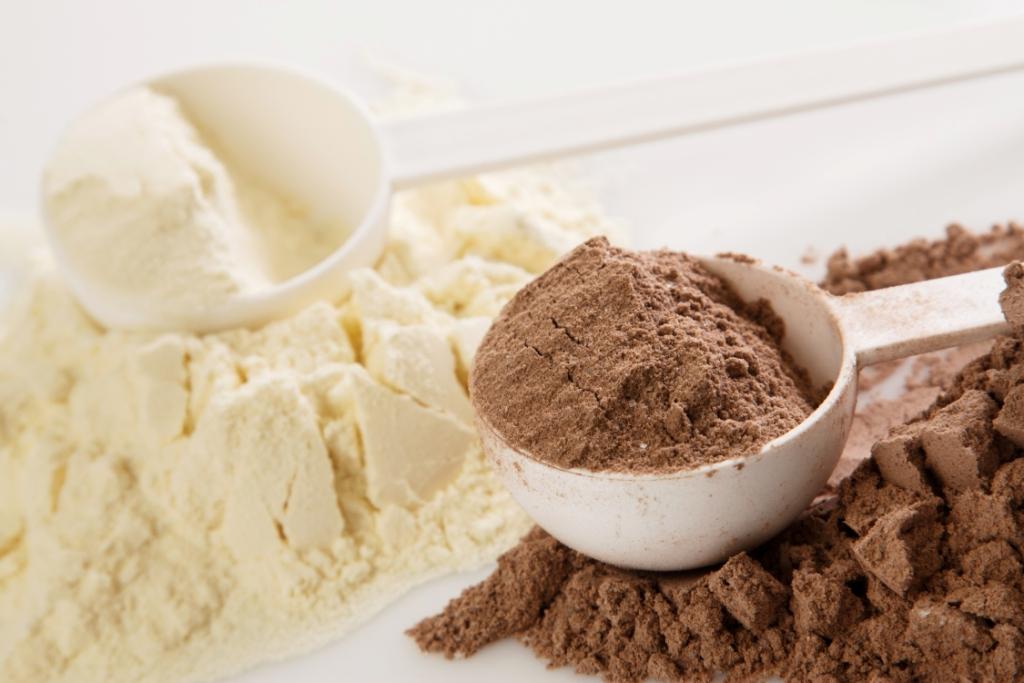The battle of supplements is imminent whether you are a gym enthusiast or a bodybuilder. The audiences are always divided when it comes to choosing between a mass gainer and a whey protein. Let us first clear the air that both types of supplements work when it comes to achieving your fitness goals. The difference lies in their composition, advantages, and potential side effects.
Before you go on to purchase a supplement, it is essential to know that difference. To make things easier for you, especially if you are a beginner, we have elaborated on those points of differences in the following article. So, without any further ado, let us begin.
What is a Mass Gainer?

As evident from the name, the mass gainer is a type of supplement that is used to increase muscle mass. People use it to get the extra set of calories to build muscle.
Mostly, mass gainers are often partaken as a shake. A qualitative mass gainer can provide up to 1200 calories per serving in a shake.
Constituents of Mass Gainer
Mass gainers are rich in carbohydrates. This is essential as carbs help in supplying the required energy to the body to build muscle.
Besides that, it contains protein, high fibre, vitamins, minerals, dietary fats, etc.
On average, a single serving of mass gainer contains carbs and protein in the proportion of 2:1 or 3:1. Such a balance is necessary to provide the essential nutrients to the body without overdoing it. Other components and their ratio might vary as per the brand.
Who Should use a Mass Gainer?
Mass gainers help provide extra and essential calories and other nutrients for those who want to gain muscle. If you are unable to gain enough calories, carbs, protein, or fat through your regular diet, a mass gainer is highly recommended.
Typically, they are beneficial for teenage males and men in their early 20s.
What is a Whey Protein?
Whey is the remaining liquid that is obtained after the milk gets curdled and strained. It is considered to be the purest protein type due to which athletes use it to enhance their performance.
It gets released into the blood flow easily and quickly, thereby helping with the digestion process.
Constituents of Whey Protein
Whey protein contains bovine serum albumin, alpha-lactalbumin, beta-lactoglobulin, and immunoglobins.
To understand its breakdown, we need to inculcate its three main types:
1. Whey Protein Concentrate (WPC):
WPC contains proteins and low levels of carbohydrates and fat. The ratio of protein depends on its overall concentration. For example, lower-end concentrates might have 30% protein while the higher end will contain 90%.
2. Whey Protein Hydrolysate (WPH):
Partial hydrolysis is a process through which it becomes easier for the body to absorb protein from any food particle. WPH undergoes partial hydrolysis, making it the “predigested” form of whey protein.
3. Whey Protein Isolate (WPI):
Lastly, WPI is the processed form of whey protein containing no fat or lactose. It is made up of 90% protein.
Who Should Use a Whey Protein?
Whey protein is the purest form of protein that can bring in tonnes of benefits for your body. It helps in improving muscle protein synthesis.
Whey protein is consumed in the form of shakes or protein bars by beginners as well as professional athletes. As it helps with the growth of lean muscle mass, it can help with the right extent of weight loss.
Fitness enthusiasts use whey protein along with resistance exercises or weight lifting to enhance and accelerate a healthy weight loss.
Advantages and Disadvantages of Mass Gainer
Now that we have a basic understanding of mass gainer, it is time to jump to its advantages and disadvantages. This can help you in choosing the best one for your fitness progress.
Advatages of Mass Gainer
Besides helping you gain muscles, a mass gainer has plenty of other benefits:
1. Contains all the Necessary Nutrients
A mass gainer is an ideal blend of essential nutrients that are necessary for the growth and development of your body.
It is rich in carbohydrates, which in turn supplies energy to your body. The calories provided by a mass gainer helps in building muscles. It is a boon for people who are unable to receive the required amount of calories from their regular diet.
The high fibre content helps in removing the toxins from the body. This leads to a better digestive system. Vitamins and minerals present in the mass gainer nourish the body.
Lastly, dietary fat helps you stay lean during the entire process.
Hence, when it comes to nutritional content, a mass gainer is hard to beat!
2. Gain Size and Strength

It is only practical to gain weight and muscles when your calorie intake is more than what you burn at the gym. This can be difficult for people who might be unable to take in calories or quickly lose weight.
If you fall under the same criteria or wish to gain weight and muscles, you need to introduce a qualitative mass gainer in your diet. It will provide all the necessary calories to your body to build your muscles without getting fat.
3. Easy to Consume

Imagine a scenario: you have just had a large meal, filling your body with all the necessary nutrients and calories. Will you be in the position to work out after that? Maybe not.
It can be intensely challenging for bodybuilders to consume a large meal before or after their workout sessions. It can make them feel bloated or increase their fatigue. But when this meal is replaced with a serving of protein shake mixed with a mass gainer, it is a smooth ride. They can get all the nutrients without having “too much”.
Disadvantages of Mass Gainer
The following are the side-effects of mass gainer that you might face:
1. Dehydration
To enhance its effect, manufacturers include creatine and caffein in mass gainers. Either one of those might work fine, but it can lead to dehydration if your mass gainer contains both of them.
2. Weight Gain
The supplements are bitter in taste. To neutralise it, manufacturers add a high amount of sugar to the mass gainer. This artificial sugar can increase the fat proportion, leading to severe weight gain.
However, you can balance it out by taking it in proportion while exercising regularly.
3. Health Issues
Taking mass gainer in higher proportion can lead to several health issues.
As mentioned earlier, a high quantity of sugar is added to mask the bitterness of supplements. This can push the pancreas to release more insulin, leading to diabetes, obesity, or heart disorders.
Taking mass gainer can lead to a bloated stomach or severe stomach ache. This can increase if you are lactose intolerant and take mass gainer with milk.
Creatinine helps in muscle growth, and mass gainers are filled with that. The proportion of creatinine in a body is only healthy to a certain extent. A higher level of it can lead to disrupting kidney functionalities.
You can steer clear of such consequences by choosing the best mass gainer. You must check the ingredients list or consult your doctor or dietician.
Advantages and Disadvantages of Whey Protein
Just like mass gainer, whey protein has its set of benefits and drawbacks.
Advantages of Whey Protein:
The following are some of the important advantages of whey protein that can help you make a better decision for your body:
1. Qualitative Source of Protein
Whey protein is the purest form of protein as it contains all essential amino acids. Moreover, it is easily digestible.
2. Health Benefits
Whey protein contains ACE inhibitors, known as lactokinins. These help in controlling blood pressure.
Along with that, it is also beneficial for people with type 2 diabetes. As it helps in moderating blood sugar, it can increase the levels of insulin as well as sensitivity.
Inflammation can get chronic if it is left untreated. But high doses of whey protein is known to reduce the blood levels of C-reactive protein. This can significantly reduce inflammation. Lastly, it also helps in regulating healthy bowel movements.
3. Promotes Muscle Growth
Whey protein is known to prevent muscle loss that could be due to age. When it is added to your diet complemented with strength training, you can certainly achieve your desired body.
Disadvantages of Whey Protein
Contrarily, the following are some of the disadvantages of whey protein:
1. Not for Lactose Intolerant
As mentioned earlier, whey is a by-product of milk. This can be harmful to people who are lactose intolerant. It can lead to gas, bloating, or diarrhoea.
But if you want to consume whey protein, we suggest you go for Whey Protein Isolate (WPI). This type of whey protein contains no lactose.
2. Weight Gain
Overconsumption of anything can lead to drastic consequences. Inculcating too much whey protein in your diet can cause your body to store the excess protein as fat. The sudden influx of calories can lead to weight gain.
Moreover, it is known to slow down the digestion process. It can also strain your kidneys and liver.
However, you can balance it out by strength training.
3. Contains Contaminants
Whey protein might contain fillers or heavy metal contaminants. This can be more prominent if you choose a brand that does not comply with the health regulations. Hence, you can avoid this by reading the ingredients, researching their purity levels, and choosing the best whey protein.
Mass Gainer vs Whey Protein: Who is the Winner?

Before we come to a conclusion, it is necessary to understand the main differences between a mass gainer and whey protein.
Firstly, a mass gainer is for increasing the body weight while building muscles. On the other hand, whey protein is for building muscles while staying lean.
Secondly, mass gainer contains more amount of carbs and fats when compared to the protein proportion. Contrarily, whey protein contains high quality of protein as well as a limited amount of fats and carbs.
Lastly, the mass gainer is an effective way through which you can include all the necessary nutrients, including calories, in your diet. Whey protein adds protein to your diet but does not amount much to anything when it comes to calories.
After comparing both- mass gainer and whey protein, it is safe to say that both are equally important when it comes to fitness and muscle growth. However, the difference will lie in the end results.
If you want to put on weight while increasing your body size to gain muscle, a mass gainer will be a healthy companion.
On the other hand, if you wish to maintain a lean body while building muscle, go for whey protein. You will not be disappointed with the results.
Note: Do not take both of them together. Choose the one that fits your goals and fitness aims.
Final Say
Supplements can accelerate your fitness process, but certain ones can have a negative biological effect on your body. Regardless of what you choose- mass gainer or whey protein, take it in proportions.
For a quick understanding, take mass gainer after your workout session, and take whey protein one hour after exercising. This will help you reap its maximum benefits for your muscle-building journey!



This info is very informative
It truly clears up what is the best choice for your
situation / achievements
& how to use properly with out blindly causing any health risks.
Thank you
I think whey is betters bt wch brands r beta wen it comes to whey
Read our article on Best Whey Protein